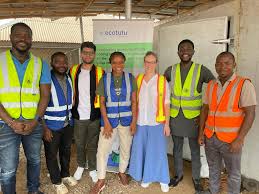Stakeholders in the agricultural sector have called for more investment in cold chain facilities to cut down on post-harvest losses and boost food security in the country.
They made this call at the Cold Chain in Agriculture Roundtable 2025, which was put together by Ecotutu, a company that provides cold chain solutions, in Lagos.
During the meeting, industry leaders and policy makers raised alarm that up to 50 per cent of agricultural produce is wasted after harvest. They explained this is due to poor storage, weak logistics, and a shortage of modern preservation facilities.
In his keynote address, Executive Chairman of Origin Group, Joseph Samuel, represented by Olusesan Ayeni, a Director at Origin Tech, described cold chain as a key infrastructure — just like roads or electricity — for feeding a growing population, boosting agricultural export, and improving the livelihoods of rural people.
He explained that although Nigeria produces large amounts of tomatoes, yam, cassava, and citrus, the poor state of its cold chain facilities makes it hard for many farmers to keep their produce fresh and reduce waste.
He called on the federal government to create a collaborative ecosystem to drive the growth of cold chain services. According to him, ignoring this problem will affect food security and lead to more economic losses.
Also speaking at the event, the Lagos State Commissioner for Agriculture and Food Systems, Abisola Olusanya, said the state is already helping innovators and startups to develop technology and data systems that can cut post-harvest waste.
She explained, “We are developing a unified database for farmers and the food industry in the state to make sure we have a more efficient, transparent and responsive food system.”
Olusanya also commended Ecotutu for providing solar-powered cold storage facilities, adding that these innovations were very helpful in reducing food spoilage.
The Deputy Consul General of the Netherlands in Lagos, Peter Keulers, announced that the Dutch government, in collaboration with the Lagos State Government, has opened Polar Store — a solar-powered cold storage — to serve as a training and demonstration hub.
He explained, “The Polar Store will help show how solar-powered cold storage can cut post-harvest losses in a country where food waste is a big challenge.”
In her welcome remarks, Ecotutu’s Head of Operations, Adejoke Nofiu, explained that Ecotutu has made progress in reducing post-harvest losses across the country.
Nofiu said, “From solar-powered mobile cold rooms to pay-as-you-chill models, Ecotutu has supported smallholder farmers and businesses to keep their produce fresh for a longer period.”
Ecotutu’s Chief Executive Officer, Babajide Oluwase, explained that the roundtable was meant to drive scalable solutions and policy framework to cut agricultural waste.
He added that solving the food preservation crisis in the country will require sustained investment in cold chain technology, policy reforms, and private sector participation.
The stakeholders at the meeting all agreed that without urgent action, the country’s growing population may suffer from food insecurity and economic hardships.
